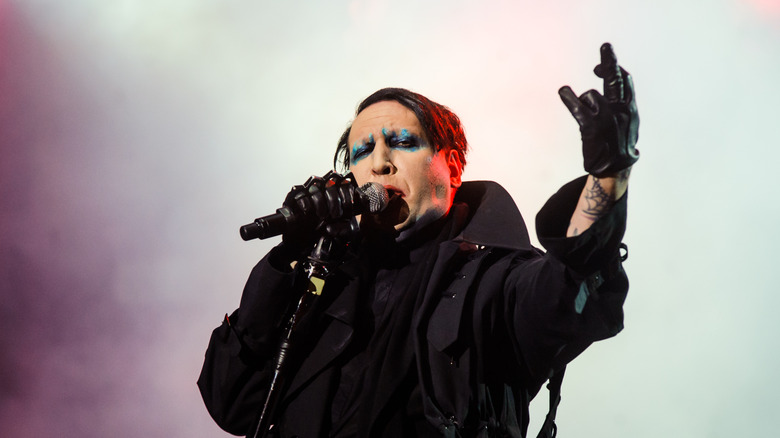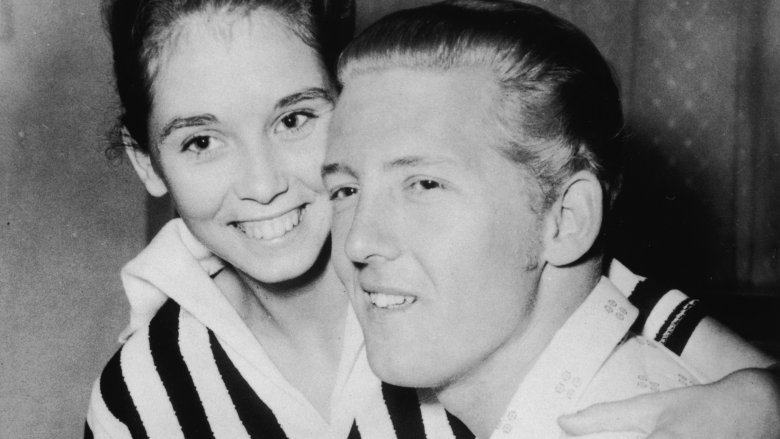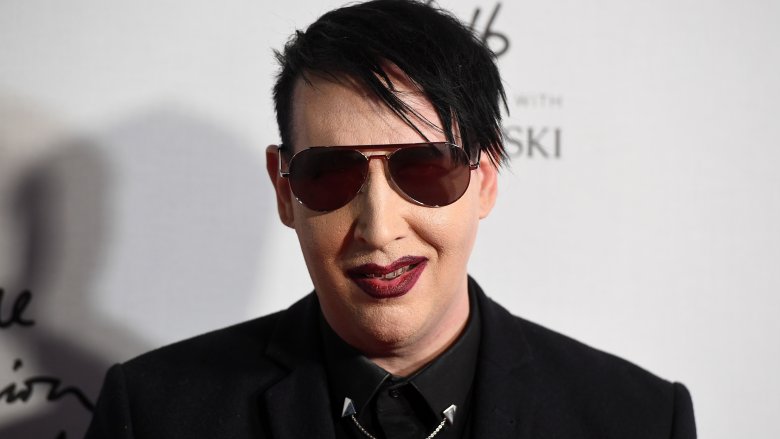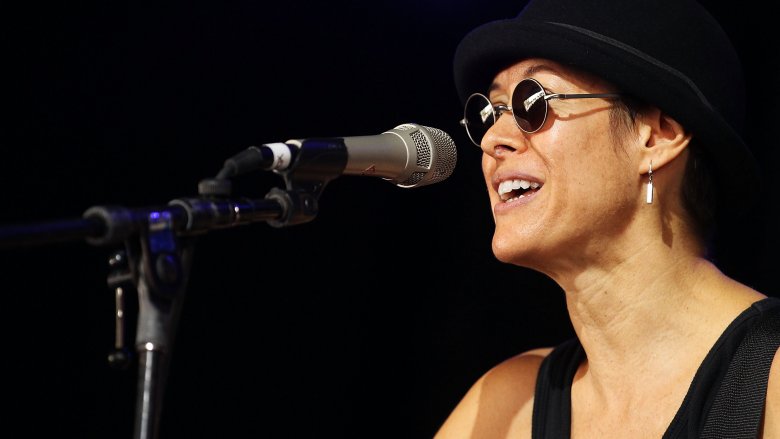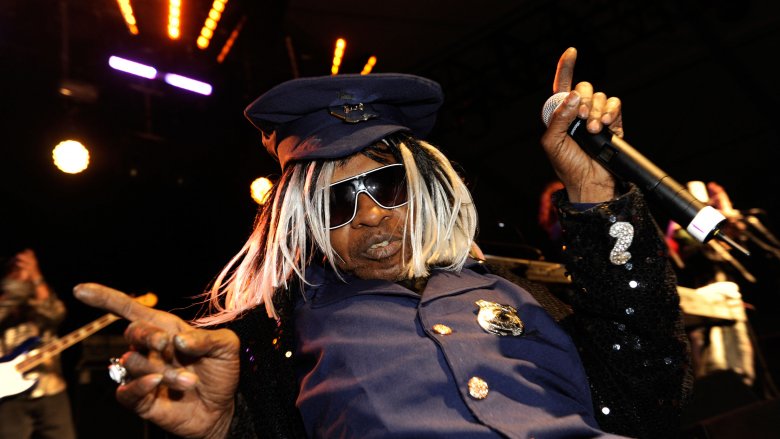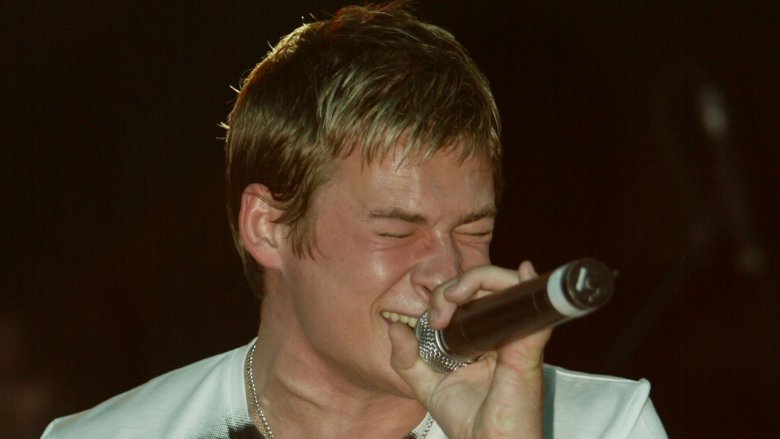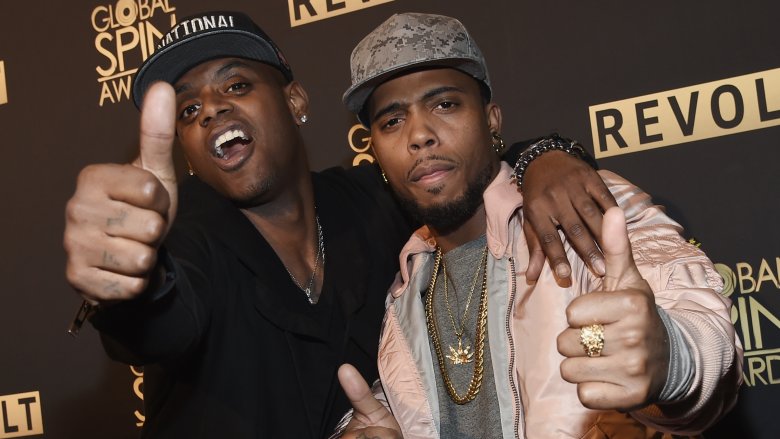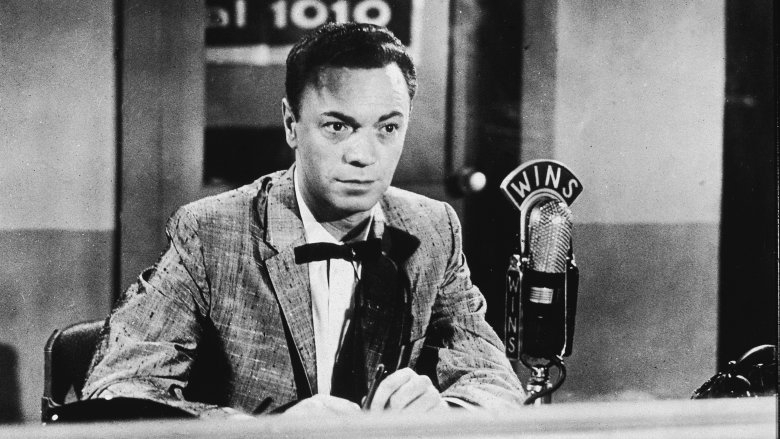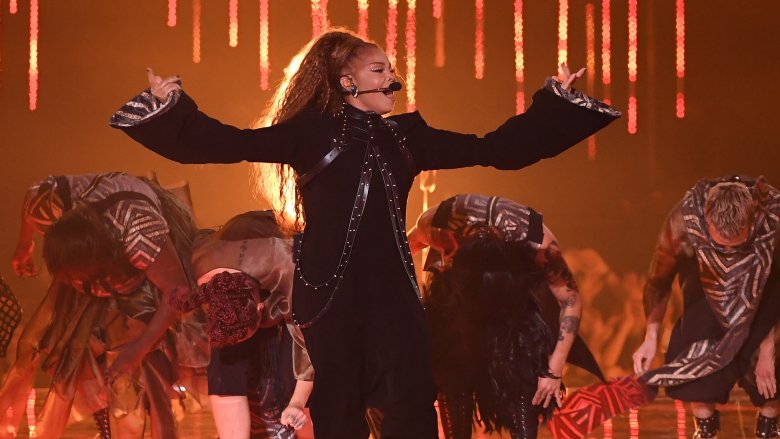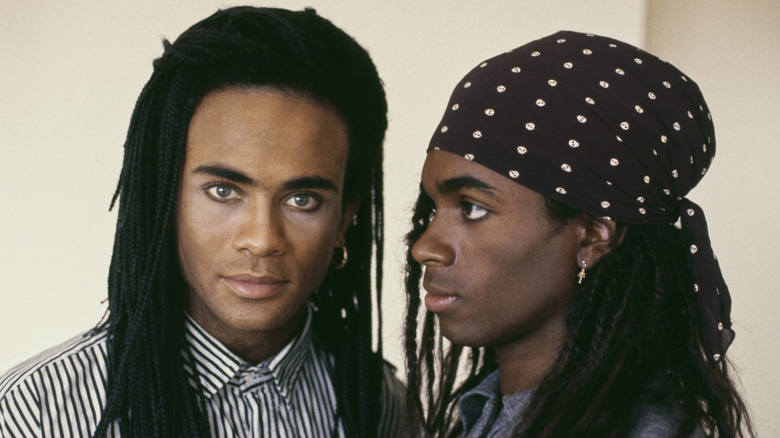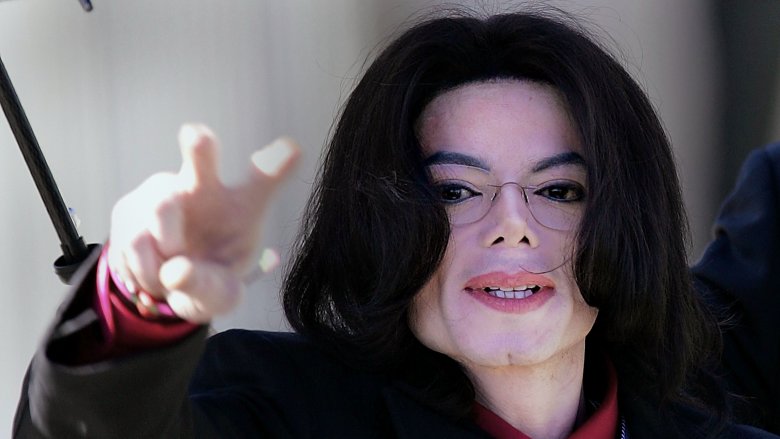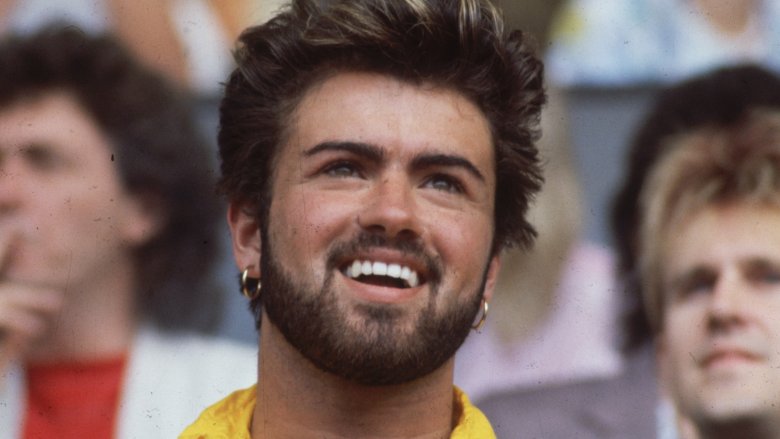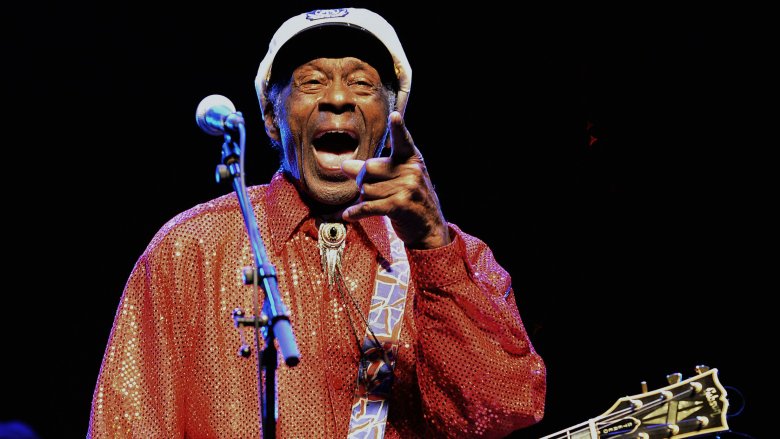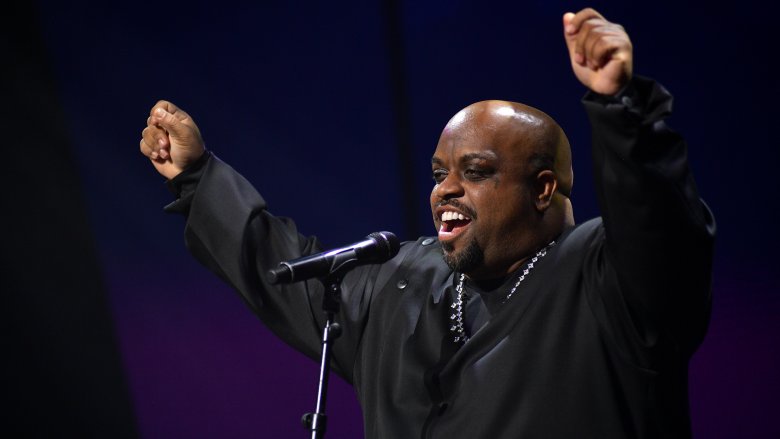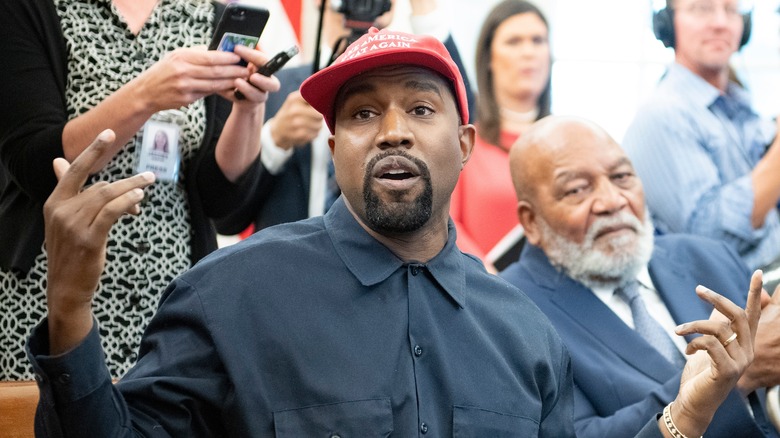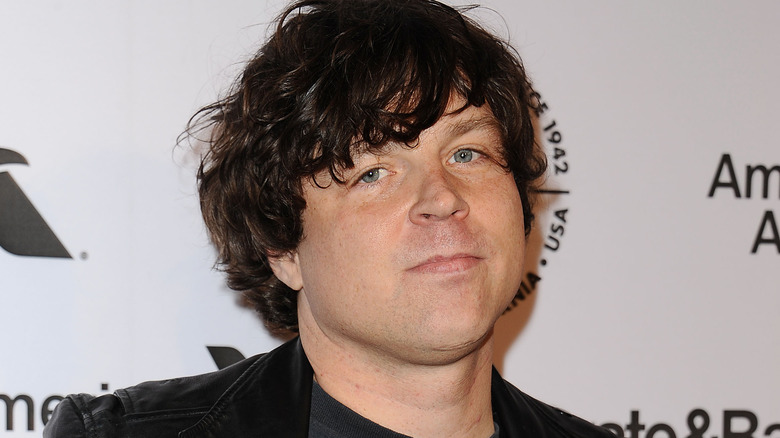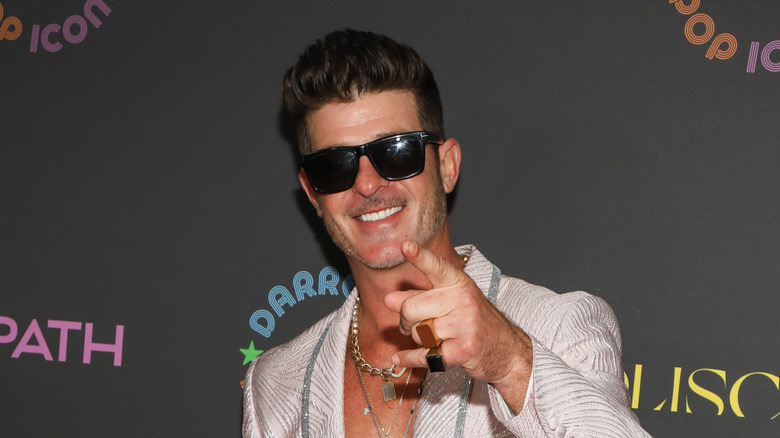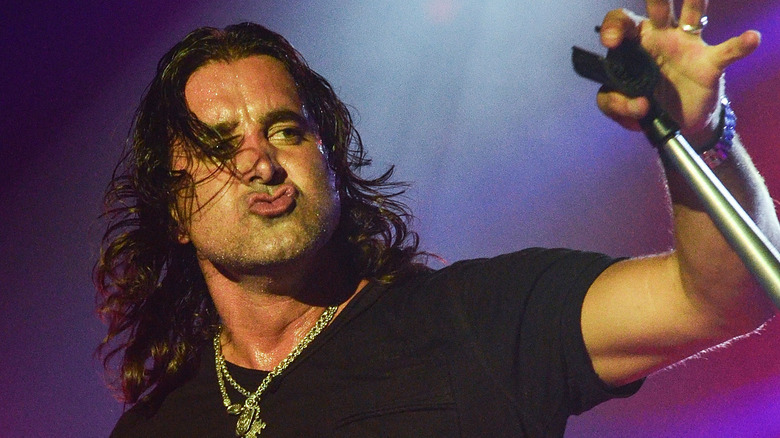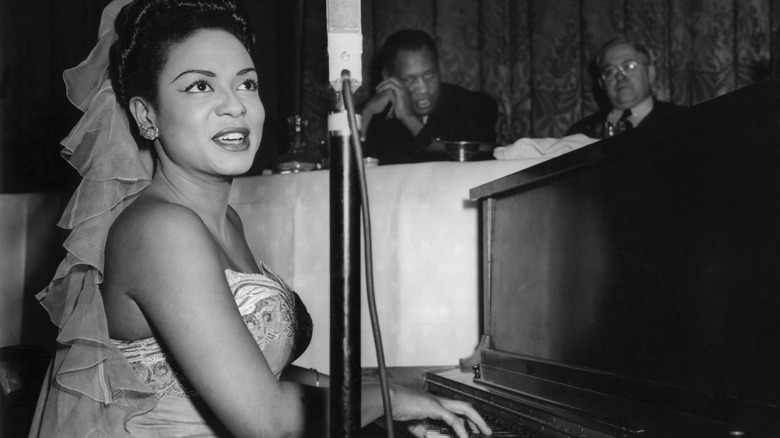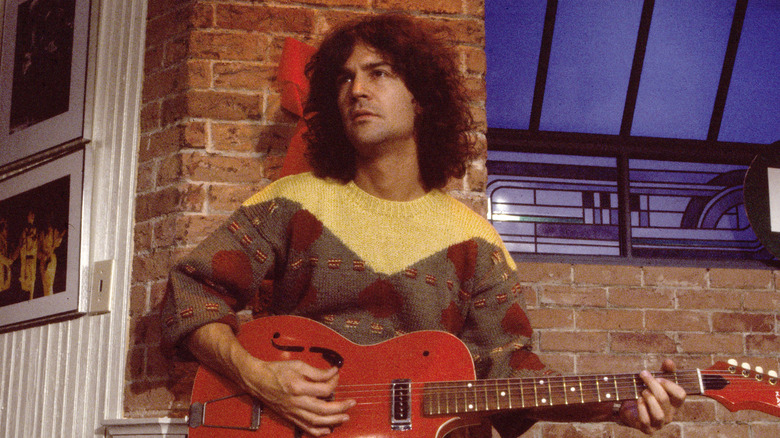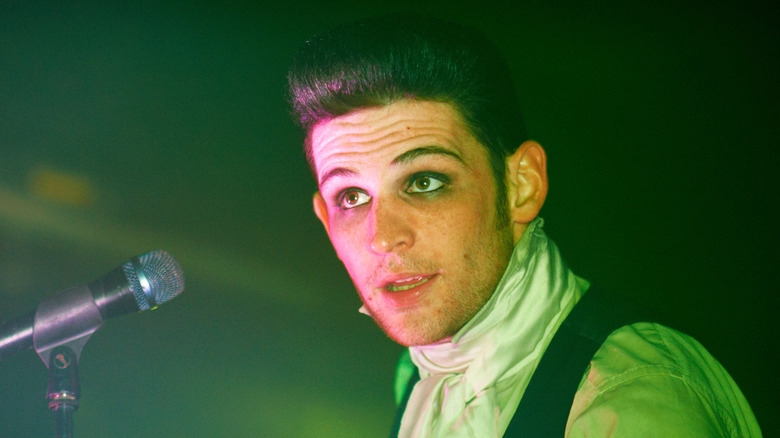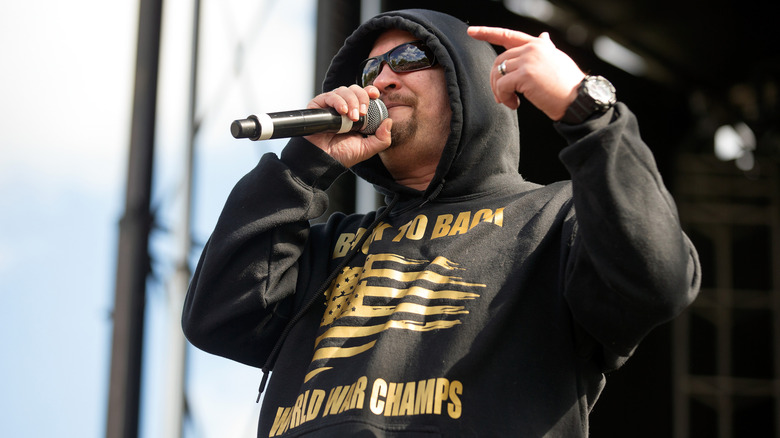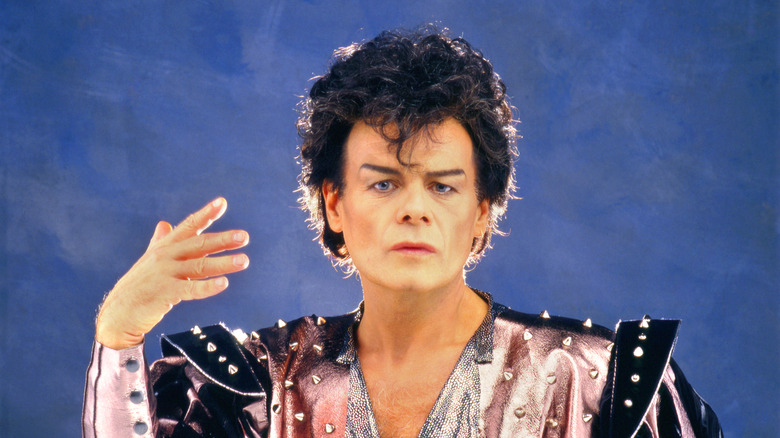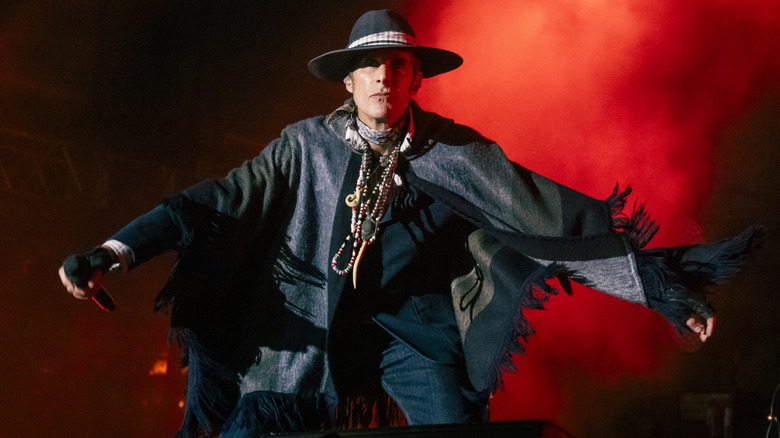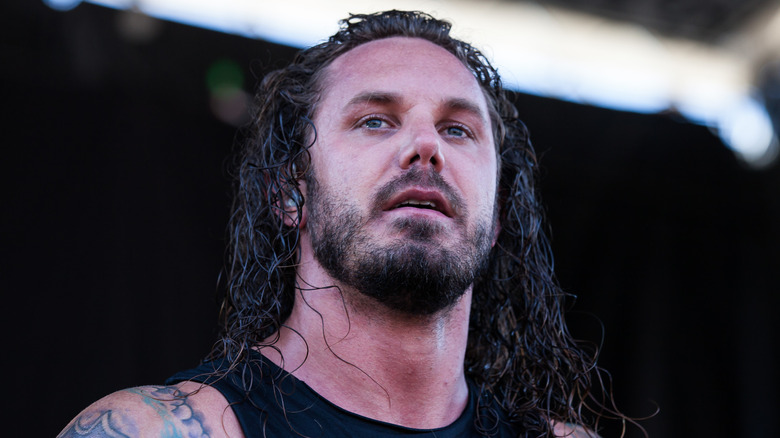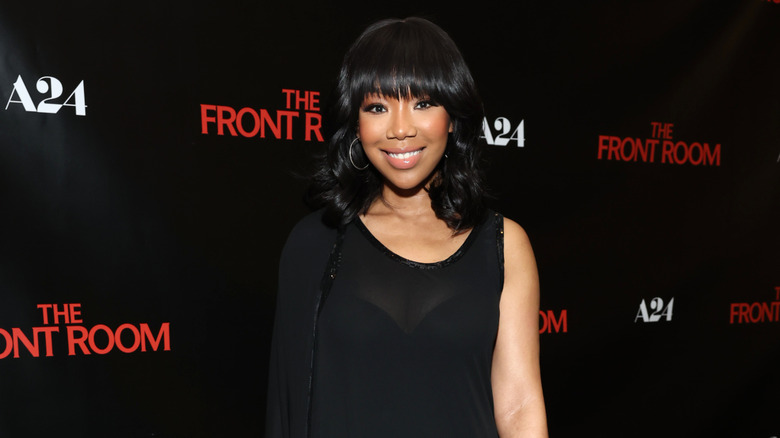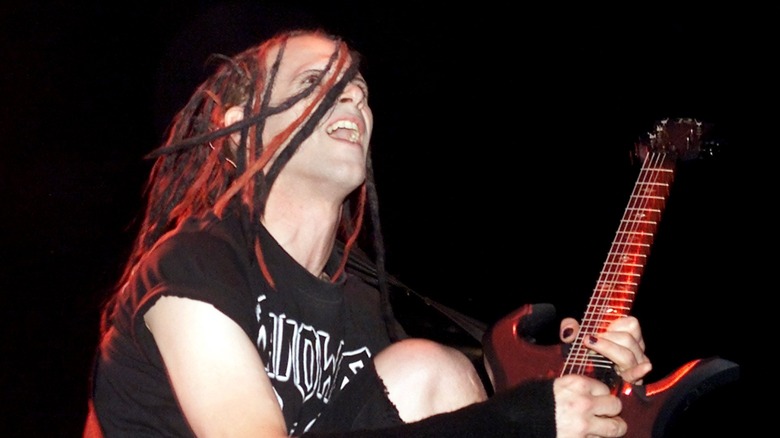The One Moment That Destroyed These Musicians' Careers
It sometimes feels like musicians can get away with anything. Justin Bieber can get arrested and still keep cranking out mediocre music. Ozzy Osbourne can bite the head off a bat and still land a mediocre reality show. Johnny Cash can publicly confess to shooting a man in Reno, just to watch him die, and still get to cut a record in Folsom Prison. What would a musician have to do to get in some real trouble?
Depending on the musician in question, maybe not so much. While some can get away with near-murder, other crooners find themselves looking down the barrel of a ruined career just for having the wrong backup dancers. If you're struggling with a hyper-successful music career and need to take the pressure off, take note; any one of these singular incidents could swiftly have you on food stamps.
The following article includes allegations of addiction, child abuse, domestic abuse, and sexual assault.
Jerry Lee Lewis introduced Britain to his child bride
In 1958, rock 'n' roll icon Jerry Lee Lewis decided to take his underage wife with him on his tour of England, and career-destroying chaos ensued. "The Killer" had neglected to tell anyone he was newly married, so when he rocked up with Myra Gail Lewis (pictured) in tow, the British press were naturally curious. A Daily Mail reporter, Paul Tanfield, happened to ask how old the newlywed was, and Lewis said she was 15. And just like that, his transatlantic career was over.
The truly shocking part is that Lewis was lying: Myra was actually 13. Worse still, she was also Lewis' cousin. Lewis flew to Britain with the barely teenage blood relative he was married to and didn't think this would somehow come back to bite him, but bite him it did. His British tour collapsed, those that showed at his gigs went only to boo him, concerts were canceled, and his expensive hotel kicked him out.
When Lewis finally high-tailed it back home to the States, he found he'd been blacklisted. Radio stations would no longer play his songs, he was dropped from TV appearances, and demand for his performances all but disappeared. However, he never lost his recording contract and continued to release (mostly unsuccessful) singles.
Eric Clapton went on a drunken anti-immigrant tirade
British guitarist Eric Clapton is the only person to have been inducted into the Rock & Roll Hall of Fame three separate times. He's also the only musician to have sparked an anti-racism movement in direct response to a speech he made. Rock Against Racism was a major music movement in Britain in the 1970s and 1980s. It was the forefather of the Love Music Hate Racism movement that you'll find at most modern British festivals, and it only exists because Clapton once acted like a drunken Archie Bunker.
In 1976, race relations were at an all-time low in Britain. The far-right National Front was attracting millions to its marches, Asian teenagers were being murdered in the streets, and even David Bowie was expressing admiration for fascism (admittedly while misusing drugs). At the height of all this, a drunk Eric Clapton clambered onto stage in Birmingham and yelled "Enoch was right ... we should send them all back" (via The Guardian).
The rest of Clapton's speech reads like a Dummy's Guide to inflaming racial tensions. The guitarist said Britain was becoming a "Black colony" and his audience should vote for the controversial racist politician Enoch Powell (like a British George Wallace) to "keep Britain white." While Clapton's outburst didn't see him totally ostracized, it did permanently stain his career in his native country. Forty years later, his name is still synonymous with racism.
Marilyn Manson was blamed for the Columbine massacre
On April 20, 1999, two kids named Eric Harris and Dylan Klebold walked into Columbine High School and started shooting. They kept shooting until 13 people were dead and over 20 injured. In the aftermath of the tragedy, America started casting around for someone to blame. Enter Marilyn Manson.
At the time, Manson was already seen by Middle America as the antichrist. When word got out that Harris and Klebold had listened to his music and were goths, the nation's moms and pops went nuts. In an interview with The Guardian, Manson later said the massacre destroyed his "entire career." His concerts were protested, he received hundreds of death threats, and bomb threats were called in to his gigs. The most aggravating part for Manson? Harris and Klebold weren't goths. They weren't even fans of Manson's music: they were into KMFDM and Rammstein.
Manson would later tell NME (via CNN) that "when it comes to things like Columbine, it would have been different if [Harris and Klebold] had actually liked my music, but I think that I have had more blame accredited to me than any person in the history of music," although, to be fair, he qualified this thoughtful take with the claim "there should be some sort of Grammy for that." What's that old adage about there being no such thing as bad publicity?
Michelle Shocked told San Francisco that God hates LGBT people
In 2013, the famously leftie country singer Michelle Shocked dropped an H-bomb's worth of LGBT slurs while playing a club in, of all places, San Francisco. According to The Guardian, Shocked took time out from her set to yell on stage, "When they stop Prop 8 and force priests at gunpoint to marry gays, it will be the downfall of civilization, and Jesus will come back," before adding, "You are going to leave here and tell people, 'Michelle Shocked said God hates f—-ts.'"
Shocked is a one-time big artist who once shared a stage with Madonna and Sinead O'Connor. After suing her record label under the 13th Amendment (which bans enslavement), Shocked dropped out of the big time and started self-releasing, relying on her hardcore fanbase to make ends meet. Her hardcore fanbase that just happened to be largely made up of liberals and lesbians.
The LGBT-slur controversy left Shocked at the center of a media storm and on the wrong side of her own fans. In a long interview piece with the singer, Dallas Morning News claimed in 2017 that the outburst sent Shocked's career into a near-terminal nosedive, losing her bookings and wiping out a planned tour. For her part, Shocked says her comments were misunderstood and weren't meant literally.
Sly Stone was busted for cocaine possession
The collapse of Sly Stone's career was less a single moment than a whole series of increasingly desperate moments that finally culminated in one uber-moment, which effectively ruined his reputation forever. Having ended the '60s playing Woodstock as the head of pioneering funk outfit Sly and the Family Stone, he segued into the '70s with a serious drug misuse issue.
The singer started missing concerts and collapsing on stage. In 1976, his pet dog mauled his son and his wife left him. In the meantime, his band broke up, but Sly could have probably recovered from all this. Failed marriages, band breakups, and drug addiction are part of the job description for troubled musicians. But there's one thing record labels in the '80s still took a much dimmer view of. In 1983, Stone was busted for cocaine possession, and he didn't work again for over a decade.
Amazingly, getting caught with cocaine wasn't the only ruinous moment of Stone's career. After starting to work again in the 2000s, he was invited to play Coachella in 2010. It was meant to be his comeback. Instead, Sly rocked up late dressed in a blonde wig (pictured), rambled incoherently, played some stuff off his iPod, and then gave up. Only a year later, the former funkmaster was homeless and living in a van.
Lee Ryan responded to 9/11 by saying elephants were more important
If you were alive in October 2001, there was only one topic of conversation on your lips. A month before, terrorists had smashed planes into the Twin Towers, killing 3,000. A wounded America was still trying to understand what had happened, while the rest of the world was still looking on in sympathy. There were some exceptions, though, including Lee Ryan of the British boyband Blue, who was not impressed with all this grief and solidarity. In an interview with The Sun on October 26 (via NME), Ryan asked, "Who gives a f*** about New York when elephants are being killed?"
The Sun quoted Ryan as then going on to say, "They are ignoring animals that are more important. Animals need saving and that's more important. This New York thing is being blown out of all proportion." The only way Ryan could have possibly dug his already-deep hole any deeper would be if he'd then ended the interview by burning an American flag.
To be fair, Ryan was 17 when he gave this interview, and asking for insightful comments from hormonal teenagers might be a bit much. Nonetheless, Ryan and the rest of Blue split a couple of years later, and they all eventually went bankrupt.
The Dixie Chicks said they're ashamed the president is from Texas
Country music and patriotism go together like country music and bourbon or country music and tragic breakups. Lovin' the stars and stripes is so integral to the heart of the country scene that it'd take a very brave or very stupid performer to say something flagrantly unpatriotic, at least while riding high in the Billboard country charts. The Dixie Chicks are those performers.
In 2003, at a time when Congress had literally changed the name of French fries to freedom fries in a show of patriotic fervor, the Chicks took to a stage in London and gave their thoughts on the upcoming Iraq War. Lead singer Natalie Maines declared to the crowd (via The Guardian), "Just so you know, we're on the good side with y'all. We do not want this war, this violence, and we're ashamed that the president of the United States is from Texas." That was the exact moment the Chicks' career hit the red, white, and blue fan.
Country music dropped the all-girl outfit like radioactive waste. Their singles plummeted down the Billboard charts before vanishing entirely. Radio stations banned their music, and they received so many death threats that they claimed they were forced to install metal detectors at their concerts. Ex-fans even held parties where they destroyed their old Dixie Chicks CDs, and their sales never recovered to their previous highs. In 2020, the group returned to the spotlight, renamed as simply The Chicks, with their first album in 14 years.
Rapper B.o.B claimed the Earth is flat
Retro is big business. The 2010s saw fashion take us back to the 1990s, and the 2000s took us back to the 1980s. In January 2016, hip-hop artist B.o.B decided to top all that by taking geography back to the Stone Age. In an unbelievable tweetstorm, B.o.B fired off endless pictures, thoughts, and "facts" all designed to prove one thing and one thing only: that the globe you had in elementary school lied to you and that the Earth is flatter than a bottle of old Pepsi.
The series of tweets has since come to define what's left of B.o.B's career. While the artist suffered only reputational damage from having the entire internet laugh at him, his subsequent Twitter spats with guys like astrophysicist Neil deGrasse Tyson sent him careening off down a rabbit hole. In September 2017, B.o.B even launched a GoFundMe campaign to raise $1 million to launch satellites into space to prove the Earth is flat. The campaign was later suspended, but not before institutions and people as respected as Buzz Aldrin, National Geographic, and NASA had taken time out from their busy schedules to troll the one musician on Earth who apparently missed the Age of Exploration.
Alan Freed broadcast film of a Black man dancing with a white woman
DJ and songwriter Alan Freed's name is obscure today, but he left behind one heck of a legacy. He's credited with being the guy who coined the term "rock and roll," and he threw the world's first rock concert. Between 1952 and 1957, he was the kingmaker of rock 'n' roll.
Which begs the question, what happened in 1957? At the time, Freed had a nationally syndicated ABC show, "Big Beat," bringing his newfangled rock and/or roll to the entire country. One evening, something so unbelievably and unremittingly anti-American happened that the network had no choice but to immediately pull the plug: "Big Beat" showed a black performer dancing onstage with a white woman.
It sounds ridiculous to 21st-century ears, but that one interracial dance was enough to get Freed's show canceled. It couldn't have come at a worse time for Freed, when his marriage was falling apart and his health was collapsing. Two years later, the final blow came. While still on the ropes from his "Big Beat" controversy, Freed was investigated by the FBI for accepting cash to play records as part of the payola scandal. What was left of Freed's career was over, and he died in 1965 penniless and destitute.
Ashlee Simpson was outed as a lip-syncer
Ashlee Simpson faded away during the late 2000s, and the moment that was probably responsible occurred during a 2004 "Saturday Night Live" performance, when she realized her band was playing the same song she had sung earlier in the show, and oops, here come the pre-recorded vocals.
Simpson was not the first artist to lip-sync a performance, but it is almost universally despised by fans, and Simpson was not forgiven for her mistake. She was relentlessly hounded by critics and former fans, not for the weird little dance she did while the band continued to play the wrong song, but for the fact that she'd actually dared to engage in deception via lip-syncing. And when she tried to explain that a severe case of acid reflux had prompted her decision to fake the performance, that sort of just made everyone hate her even more.
The two albums that followed her fateful SNL performance undersold the one she'd been promoting at the time, and she never had another top-10 song.
Sinead O'Connor upset every Catholic in America on live TV
"Saturday Night Live"-related career derailment was pioneered in 1992 by Sinead O'Connor, when she sang Bob Marley's "War" and then ended her performance by ripping up a photograph of the Pope.
It's unclear what she thought was going to happen, but generally speaking, there are some lines you just don't cross. You don't stand on a chair at a country music festival and shout "death to America," for example. And you don't rip up a picture of the pope on live television in a country where, at that time, nearly 25% of the population happens to be Catholic.
To be fair, she was protesting the sexual abuse of children in the Catholic church, which is a problem the general public is much more aware of today than it was in 1992. And back then most Americans were especially clueless about the issue because it was mostly being brought to light in Ireland. O'Connor became so unpopular after that little faux pas that she was booed at Bob Dylan's 30th-anniversary concert just two weeks later. Not long after that, she announced her retirement. She didn't stay retired, of course, but she was never able to quite recapture the success she'd once had.
Janet Jackson was exposed by Justin Timberlake at the Super Bowl
During the halftime show at Super Bowl XXXVIII in 2004, Justin Timberlake pulled down Janet Jackson's leather bustier and exposed her breast to a television audience of roughly 100 million people. Both artists later said the stunt had only been sort of intentional: Timberlake was supposed to reveal the red lace under Jackson's bustier, but he ended up tearing off the whole thing.
The American viewing audience, Viacom, and the FCC proceed to lose their collective minds. Around 540,000 people complained to the FCC, and the FCC responded by attempting (and failing) to fine CBS $550,000 for the incident, which lasted roughly 9/16 of a second. But the person who suffered most was Jackson.
Viacom, which owns MTV, CBS, VH1, and a bunch of radio stations, wanted revenge, so they banned her music from all their properties. A bunch of other media companies did the same thing, and pretty soon no one was playing Janet Jackson songs anymore. And just in case she didn't get the message, she was also uninvited from the Grammys. It's worth noting that Timberlake's career was largely unaffected, even though he was the guy who actually did the deed.
Milli Vanilli's backing track skipped during a live MTV performance
The Monkees got a lot of shade for being a "manufactured band," but they survived for decades because they never lied about what they were. History doesn't remember the '90s pop group Milli Vanilli quite so kindly because Milli Vanilli was all lies: Front men Rob Pilatus and Fab Morvan had basically just lip-synced their way to fame and fortune. They didn't even do their own singing in the studio, as their voices were 100 percent other singers who were sworn to secrecy.
So how did Pilatus and Morvan end up as the faces of Milli Vanilli when other people were doing all the singing? Producer Frank Farian thought the real singers were unmarketable, so he hired a couple of models to pretend they were the ones singing. What he didn't seem to comprehend was that you can't keep a lie that size quiet forever, especially not when it got you a Grammy.
In 1989, Milli Vanilli was doing a live performance on MTV when the backing track skipped, and that's what clued in the media, who did some further digging and discovered that Pilatus and Morvan actually did none of the singing. Milli Vanilli lost their Grammy and that was pretty much the end of that.
Police saw a revealing Michael Jackson documentary
Michael Jackson's 2005 trial was the media circus of the century. Jackson was accused of sexually molesting Gavin Arvizo, who was 15 years old at the time. He was acquitted, but since then no one has really been able to agree on whether he was actually a child molester or just a seriously weird dude who liked to have sleepovers with kids. Still, even if Jackson were the latter, there's no doubt he made some really stupid and arrogant choices.
One of them was the fact that he regularly allowed young boys to sleep in his bedroom and pretended like there wasn't anything weird about it. And he even said as much in the 2003 documentary "Living with Michael Jackson," which was probably the moment that led to his downfall. Police saw the film, opened an investigation, raided Jackson's Neverland Ranch, and the circus began. It didn't matter that he was acquitted because most people had already made up their minds.
In the years following the trial, Jackson developed a dangerous prescription drug addiction. His dependence on the anesthetic propofol deprived his body of real sleep and gave him severe symptoms of sleep deprivation, which included an inability to remember lyrics or learn new dance moves. His career stagnated and his debts continued to mount. Ultimately, it was propofol that killed him in 2009.
George Michael was caught being naughty in a public bathroom
Pop singer George Michael was famous in the '80s for being a sex symbol and for having a 5 o'clock shadow that seemed unresponsive to normal shaving. In 1998, Michael was arrested for engaging in a "lewd act" in a public restroom.
After that all went down, he didn't just crawl into a hole and hide; he considered it his moment. The once-reclusive Michael was suddenly agreeing to interviews, and by the end of the scandal, he'd gone from a closeted pop star to an out-and-proud gay pop star. He had technically already come out, just no one had noticed. Friends and family found out years before the bathroom incident, and he'd been alluding to it in song lyrics for just as long.
Michael's career never really recovered, though, at least not in America, where attitudes skew more conservative. Nonetheless, Michael is still remembered for publicly embracing his sexuality and helping young gay people feel like they could do the same.
Chuck Berry's house was raided after he secretly taped women in public restrooms
In 1990, police seized weapons, pornographic videotapes (some of which appeared to show underage girls), marijuana and hashish, and $130,000 in cash from Chuck Berry's home. Not long after that, several women filed a class-action lawsuit against him alleging that he had video cameras hidden in the bathrooms of his house and a restaurant he owned, which he would use to record women while they were dressing, undressing, or using the bathroom.
Berry got off pretty lightly, though: he was charged with drug possession and child abuse, but the child abuse charges were dropped and he was sentenced to just two years of unsupervised probation, plus $5,000 paid to a drug rehabilitation program. However, the incident also cost Berry $1.2 million in legal fees.
His career wasn't ruined in the sense of blacklisting or a downward spiral of drug addiction and despair. In fact, he kept on performing, but pretty much no one could go see him without feeling seriously icky about it. The good news for Berry is that he was already a superstar when the whole bathroom surveillance thing came to light. The bad news is that no one can really talk about his legacy anymore without remembering the gross and unconscionable stuff he did in the late 1980s.
CeeLo Green said it's not rape if they're unconscious
In 2014, CeeLo Green's career-defining moment was the one in which he took to Twitter to proclaim his innocence after he was accused of raping an unconscious woman. According to The Guardian, he stated: "People who have really been raped REMEMBER." And then he also tweeted some nonsensical stuff about how you can't be "with" someone if you're unconscious, which only made him look even more guilty.
Somehow, Green managed to squirm his way out of the allegations and was convicted of a lesser charge of supplying drugs, because fame is powerful. He got three years' probation and community service, but his career never really recovered. The most notable thing he's done since was a performance during the opening ceremonies at the 2017 World Aquatics Championship in Budapest, as well as some voice work on the children's animated series "Teen Titans Go!" and "The Proud Family: Louder and Prouder."
Kanye West went on an antisemitic social media rant
There was a time when Kanye West — whose legal name is Ye — was hailed as a groundbreaking artist, thanks to a seemingly never-ending string of massive hits and collaborations with everyone from Jay Z and Rihanna to Daft Punk and Jamie Foxx. In recent years, however, West has become better known for his outlandish antics and controversial statements than his music.
West's real-life story is tragic, but over time, more and more people have been distanced by his unpredictable behavior, from publicly wearing a "White Lives Matter" shirt to his controversial political views. For many, the last straw came on October 9, 2022, when West unleashed a torrent of antisemitic messages on X (formerly known as Twitter).
The incident was merely the latest in West's long line of similar behavior, and it was clear that he didn't expect backlash. "I can say antisemitic s*** and Adidas cannot drop me," he boasted on the podcast "Drink Champs" (via Forbes) before the tweets. As it turns out, he was wrong. Adidas, his most lucrative collaborator, ended up dropping West in the wake of the scandal, slashing around $900 million of his estimated net worth. Combine this with a number of other lost business partners, significant public outrage, and various labels and agencies disowning him, and it's clear that West's reputation has taken a quite possibly unrecoverable hit.
Ryan Adams exploited aspiring female muscians
It's easy to pinpoint the exact date Ryan Adams' career as a beloved, Grammy-nominated singer-songwriter ground to a halt. On February 13, 2019, The New York Times published a lengthy story that detailed multiple allegations against the celebrated artist, including descriptions of psychological and emotional abuse, and a pattern of using his fame and esteem as leverage to attract aspiring female musicians and not following through with his promises of help and collaboration. Per the article, one of Adams' alleged victims was underage. On July 3, 2020, Adams published a long apology letter in The Daily Mail, expressing his intentions to improve himself and seek help for his substance abuse issues, and admitting that his actions are unlikely to be fully forgiven.
"To a lot of people this will just seem like the same empty bulls*** apology that I've always used when I was called out, and all I can say is, this time it is different," he wrote. "Having truly realized the harm that I've caused, it wrecked me, and I'm still reeling from the ripples of devastating effects that my actions triggered. There is no way to convince people that this time is truly different, but this is the albatross that I deserve to carry with me as a result of my actions."
Adams has continued to make music after the sexual misconduct allegations, but his Billboard 200 days seem to be behind him.
Robin Thicke blurred lines a bit too much
In 2013, singer Robin Thicke scored a massive hit with the chart-topping "Blurred Lines," which went on to cause enough controversy to last a lifetime. British student unions started banning the song, and several media outlets called attention to its uncomfortable lyrics, which many felt landed on the wrong side of sexual consent. It didn't exactly help that the song became associated with a highly controversial MTV Video Music Awards performance, in which Thicke performed with Miley Cyrus, who later told The New York Times that Thicke had explicitly requested that she'd wear as little as possible.
While he was able to pivot into a gig as a talent show panelist, Thicke hasn't come close to the heights of his earlier success with the music he's released after the "Blurred Lines" outcry. What's more, the song has become the opposite of a gift that keeps on giving for Thicke, since it resurfaces every once in a while to make things even more uncomfortable.
In 2019, the song's co-writer Pharrell Williams told GQ that he came to dislike the song's lyrical content once he understood its full context. What's more, model Emily Ratajkowski — who starred in the "Blurred Lines" video — alleged in her book "My Body" that Thicke had groped her during the filming.
A bad concert experience caused fans to sue Creed
In 2003, four fans sued Creed because they felt a 2002 concert that the band played near Chicago was bad. A judge dismissed the lawsuit in 2003, but Creed never recovered and broke up in 2004 after a long dormant period.
There was bad blood before, but in a 2004 interview with MTV News (via Ultimate Classic Rock), singer Scott Stapp made clear that he considered the lawsuit to be a major factor in their implosion. "Basically the people who sued just wanted the press and attention and money," Stapp said. "Everybody didn't sue; it wasn't a class-action suit. I think what got [Creed guitarist Mark Tremonti] upset was that it was his hometown and two people in the newspapers were bashing his band."
The reason the fans filed the lawsuit was Stapp's allegedly visible intoxication during the show, which followed several well-publicized issues the singer had faced throughout the year. Stapp has a history of addiction and mental health issues, which continued after Creed broke up and contributed to a breakdown in 2014. Fortunately, later years have found him in a more positive place. "When you start mixing alcohol and substances to self-medicate, that's a toxic combination," Stapp said in a 2019 interview on "Nightline." "That can create a human being that is so far removed from who you are, because of the chemicals inside of you, that you can say and do some pretty nasty things."
Hazel Scott was blacklisted for speaking out
Singer and jazz pianist Hazel Scott was not only a groundbreaking musical prodigy, she was one of the major celebrities of the 1940s and seemed to find success in all fronts of entertainment. Apart from her music career, she appeared in TV shows and movies. She even hosted her own short-lived "The Hazel Scott Show." Most impressively, she was a Black artist who was able to not just evade the unsavory attitudes of the era, but she actively fought against them, refusing to appear in projects that depicted Black people as racist stereotypes or play segregated venues.
Unfortunately, Scott's activism and willingness to stand up and challenge the powers that be were her career's undoing. She was falsely accused of communist sympathies, and when she voluntarily appeared before the House Un-American Activities Committee to defend herself, she was promptly blacklisted in 1950. This McCarthyism-era move was particularly hard on Scott, who suddenly had no way to stay in the public eye. Scott and her family dodged the hostility on the home front by moving to Paris, but while she continued both her artistry and her activism, her career never recovered.
Billy Squier made a bad music video
In the early 1980s, Billy Squier's songs were a fairly common sight on the charts. After 1984, things have been much slower for the man who could have been a major rock star. Squier didn't sink because his music suddenly couldn't cut it, or because of some terrifying skeleton in his closet. His fate was sealed by his single "Rock Me Tonite" ... or rather, its music video, which many professionals consider abysmal, Squier included. "When I saw the video, my jaw dropped," he said in the book "I Want My MTV" (via Onstage Magazine). "It was diabolical. I looked at it and went, 'What the **** is this?'"
For rock music, 1984 was the year of Bruce Springsteen's "Born in the USA" and U2's "The Unforgettable Fire" — a time when comparatively plain-clothes rockers ruled and the great hair metal albums had only started emerging. In other words, it was not the optimal time for a rock musician to release a massively campy music video that featured satin sheets, the artist's bare chest, and an unfortunate crawling, hand-flapping dance choreography that would look awkward even if it was performed by a trained dancer instead of Squier himself. Just like that, Squier's rise to rock's upper echelons was effectively over thanks to a single awful music video even he hated.
While this is a sad story, there's a fun epilogue: Hip-hop artists love sampling Squier's songs, so at least his music lives on.
Lostprophets were lost the second their singer's crimes were revealed
In October 2013, Welsh rock band Lostprophets announced their breakup on their since-deleted Facebook page (via the BBC). "We can no longer continue making or performing music as Lostprophets," the statement read. "After nearly a year of coming to terms with our heartache, we finally feel ready to announce publicly what we have thought privately for some time. Your love and support over the past 15 years has been tremendous, and we'll be forever grateful for all you've given us. As we look forward to the next phase of our lives, we can only hope to be surrounded by people as devoted and inspiring as you guys have been."
The reason behind such dramatic wording is that the reason behind the band's end was particularly tragic and shocking even by rock band standards. As the statement noted, the band's story was effectively already over well before the decision to split up was made public — namely, in 2012, when allegations that Lostprophets frontman Ian Watkins had sexually abused minors surfaced. Understandably, the other band members weren't comfortable with continuing under the Lostprophets banner and opted to end the band. As for Watkins, the singer was sentenced to 29 years in prison and six years in probation for 13 counts of increasingly horrifying child abuse charges (per CBS News).
Wil Francis was accused of running a sex cult
In the 2000s, horror-themed band Aiden rocked the emo scene. While the group never reached the heights of the Misfits, it built up a legion of fans for energetic live shows and poignant performances from vocalist Wil Francis. As Aiden reached its end, Francis ventured into a dark wave career under the guise of William Control.
In 2018, The Daily Beast published a comprehensive report that saw various women accuse Francis of running his own sex cult. The shocking allegations included that Francis groomed girls from a young age, demanded they get his initials tattooed on them, and forced them to sign blood contracts.
Francis addressed the allegations in a now-deleted social media post (via Theprp.com), claiming he had met with the police beforehand and that they declined to bring charges against him after he showed them proof of his relationships with various women. "I have, in the past, engaged in heavy role play and bondage relationships WITH consent," Francis wrote. "However, I do not engage in that sort of play anymore. And for anyone who feels as though I have hurt them or violated their consent, I am sorry. It won't ever happen again. There are lots of things that have been said that are outright lies." Francis shut down plans for his new record, then released a series of videos addressing the allegations. Despite this, his career was never the same after the sex cult claims.
Tory Lanez shot Megan Thee Stallion and lost it all
Canadian rapper Tory Lanez made a name for himself in the rap world. However, his life and career changed forever in July 2020, after an argument broke out at a Hollywood party and shots were fired. Lanez was arrested for carrying a concealed weapon, while it was believed that Megan Thee Stallion had received wounds to her foot from broken glass. According to Megan's recollection of events on her Instagram Stories (via Variety), though, she exited a vehicle when Lanez opened fire and shot at her.
The Tory Lanez and Megan Thee Stallion case played out in the public eye, with Lanez even dropping an album denying her claims that he shot her. However, it all came to a head in 2023. As reported by NBC News, Lanez was sentenced to 10 years behind bars for "assault with a semi-automatic firearm, carrying a loaded, unregistered firearm in a vehicle and discharging a firearm with gross negligence."
Speaking before his sentencing, Lanez issued an apology, stating, "If I could change it, I would, but I can't. Everything I did that night, I take full responsibility. I truly am just trying to be a better person."
Chris Volz tanked Flaw after using a racial slur
Ah, Flaw. The band might not be the first name that comes to mind when listeners think of nu metal — one of metal's most popular subgenres — but it has hovered around the scene for as long as anyone can remember. It also hasn't been short on controversy, including the time when its former guitarist/bassist Tommy Gibbons became embroiled in a plagiarism scandal, where he was accused of stealing music from YouTubers.
Yet Flaw, despite its flaws, appeared to survive every bit of negative press, until 2021 that is. During a concert in March of that year, vocalist Chris Volz used a racial slur from the stage. Expectedly, video footage of the incident made the rounds on social media. At first, Volz published a bizarre indirect reference to the event in a now-deleted social media post where he spoke about cancel culture and freedom of expression. Volz then issued a more direct apology on Facebook where he denied he was a racist, saying he "used an unacceptable group of words towards another white person" and "take[s] responsibility for [his] actions, apologize[s] for [his] meltdown and hope[s] that you can all forgive [him]."
Regardless, record label Noble Steed Music cut ties with Volz. For Flaw, the band continued to fall apart with various member departures since the incident.
Serious accusations leveled against Tyler Carter ended Issues
The departure of various band members from Woe, Is Me resulted in the creation of a new metalcore band, Issues, in 2012. Due to Tyler Carter's unique vocal style, Issues stood out as a unique band among its contemporaries as it blended R&B crooning with heavier elements.
In 2020, accusations surfaced of grooming and sexual misconduct on Carter's part, including a lengthy and detailed allegation shared by Miss Fortune vocalist Mikey Sawyer. It didn't take Issues long to act, posting a message on X that said it "will no longer be working with Tyler." On his now-deactivated X account (via Loudwire), Carter wrote that he "escalated conversations and abused [his] power," but denied that he "never physically assaulted anyone."
After a difficult 2020 compounded by the COVID-19 pandemic and Carter's firing, Issues announced its disbandment in 2023 with a final set of shows. Carter went on to form Emerald Royce with Attila's Chris Linck; however, it's safe to say he's no longer the scene darling he once was with Issues.
Brand New's Jesse Lacey was accused of inappropriate behavior with minors
You cannot discuss the bizarre history of emo music without mentioning Brand New. The New York band is often considered one of the most seminal groups of the genre and appreciated by even non-emo fans. While its output waned in the 2010s, it returned in style with the Billboard 200 chart-topping album "Science Fiction" in 2017.
Not long thereafter, a now-deleted Facebook thread (via Rolling Stone) surfaced where a number of women alleged sexual misconduct from Brand New frontman Jesse Lacey. One commentator claimed that Lacey asked her for nude pictures when she was an underage teenager.
While Lacey didn't address the allegations individually, he posted a lengthy message on the band's Facebook page. In the post, he wrote, "The actions of my past have caused pain and harm to a number of people, and I want to say that I am absolutely sorry. I do not stand in defense of myself nor do I forgive myself. I was selfish, narcissistic, and insensitive in my past, and there are a number of people who have had to shoulder the burden of my failures." After this scandal, Brand New quietly disappeared from the public limelight, only reuniting for a small secret show in December 2024.
The pictures on Gary Glitter's computer ended his career
In the '70s and '80s, English rocker Gary Glitter dominated the music charts, with his track "Rock and Roll" becoming synonymous with sporting events around the globe. At the same time, his glam rock appearance and over-the-top stage shows made him an unmissable live performer.
In the late '90s, Glitter took his personal computer into a store for repairs. The technician discovered disturbing and sickening images of children on his hard drive, reported it to the authorities, and Glitter was arrested by the police when he came to pick up his computer. According to the investigation, they found over 4,000 images of young boys and girls on Glitter's computer. Glitter received a four-month prison sentence and was placed on the sex offenders register. The incident also marked the end of his career and destroyed his reputation among the public.
After his fall from grace, Glitter left England. However, he was convicted for further crimes against children in the mid-2000s, then jailed again in 2015 for crimes against schoolchildren in the 1970s.
Sigur Rós' drummer Orri Páll Dýrason left the band and music scene after a serious allegation
Sigur Rós doesn't play any ordinary type of rock, as the band incorporates a plethora of eclectic sounds and instruments into its music. In 2018, the Icelandic group made news for all the wrong reasons after drummer Orri Páll Dýrason was accused of sexual assault by artist Meagan Boyd. In a conversation with Pitchfork, Boyd claimed that Dýrason assaulted her while she slept next to him in January 2013. "I just wanted to speak my truth," Boyd said. "I sincerely hope it leads to Orri admitting the truth publicly and an apology to me."
On October 1, 2018, Dýrason announced his departure from Sigur Rós in a Facebook post. "I will do anything in my power to get myself out of this nightmare, but out of respect for those actually suffering from sexual violence, I will not take that fight public," he added.
It remains unclear what happened thereafter, with the only real news being that Dýrason's lawyer attempted to stop newspaper Stundin from publishing an interview with Boyd. According to Dýrason's Facebook page, he has continued to play shows here and there with other artists, but it's a far cry from the level of success he achieved with Sigur Rós.
Carlos Santana's anti-trans sentiment didn't impress the community
Carlos Santana is widely regarded as one of the best guitar players of all time. During a 2023 concert, for some reason Santana thought it wise to address the audience and let them know he only believes in two genders, man and woman. He also brought up being in solidarity with comedian Dave Chappelle, who had been in the headlines for his controversial comments about the transgender community.
Clips of Santana's speech from the stage found their way online rather quickly, and he received backlash for what he said. Eventually, Santana issued a statement to Billboard. "I am sorry for my insensitive comments," Santana wrote. "They don't reflect that I want to honor and respect all [people's] ideals and beliefs. I realize that what I said hurt people and that was not my intent. I sincerely apologize to the transgender community and everyone I offended."
Mumford & Sons' Winston Marshall's support for a controversial figure caught heat
March 2021 changed the trajectory of Winston Marshall's life and musical career. The former Mumford & Sons guitarist posted a now-deleted message on X (via the Los Angeles Times), sharing his latest read along with a caption praising the book's author for being "a brave man." The issue was that the author of the book was controversial right-wing figure Andy Ngo, who has been accused of spreading misinformation and sowing seeds of discord among the public.
It didn't take long for social media users to blast Marshall for his post, even as he tried to apologize and defend his position. Ultimately, the event led to Winston Marshall quitting Mumford & Sons.
Marshall posted a lengthy article on Medium, explaining his reasons for leaving the band and the controversy of his X post. "Posting about books had been a theme of my social media throughout the pandemic," Marshall wrote. "I believed this tweet to be as innocuous as the others. How wrong I turned out to be." He added that he struggled to see how "commenting on a book critical of the Far-Left could be interpreted as approval of the equally abhorrent Far-Right."
Jane's Addiction singer Perry Farrell's assault of his bandmate on stage was the last straw
One of the untold truths of Jane's Addiction is that the rock band has broken up nearly as many times as the number of albums it has released. Like a couple in an on-off relationship, everyone expects to see its members get back together after they work through their differences. However, singer Perry Farrell's antics in a September 2024 reunion concert might have been a step too far for even the most diehard Jane's Addiction fan.
The show saw the classic line-up of Farrell, Dave Navarro, Eric Avery, and Stephen Perkins reunite and perform on the stage together. In fan footage that circulated of the gig, Farrell angrily approached Navarro, who tried to hold the vocalist back with his hand. The matter escalated and Farrell punched Navarro, as other parties rushed on stage and pulled Farrell back. Navarro didn't retaliate.
Expectedly, the remaining dates of the tour were cancelled. In a statement to USA Today, Farrell said he apologized to his "bandmates, especially Navarro," for his behavior and took "full accountability" for the incident.
As I Lay Dying's Tim Lambesis tried to hire a hitman to take out his wife
As I Lay Dying was considered one of the premier metalcore bands, alongside other heavy hitters like Killswitch Engage and Trivium. In 2013, everything changed after vocalist Tim Lambesis was arrested "on charges of solicitation of another to commit murder and conspiracy to commit a crime" (via NBC News). According to reports, Lambesis approached his gym trainer and asked if he knew a hitman to get rid of his wife. This led to Lambesis meeting with an undercover cop and being arrested.
In 2014, Lambesis pled guilty and received a six-year sentence. Lambesis was released on parole in December 2016 and reformed As I Lay Dying. However, all the members of the band quit in 2024 within days of each other, with one member citing concerns about the environment of the group. Matters only worsened for Lambesis as recorded arguments between him and his new wife surfaced, as well as videos of him hurting their dog.
Brandy's car crash turned fatal and her career wasn't spared
Brandy Norwood, better known as Brandy, was one of the stars of the '90s. She proved to be a double threat in the entertainment industry, becoming a TV star with her sitcom "Moesha" and climbing the music charts with hits like "The Boy Is Mine." Brandy's star continued to rise, as she carried over the popularity into the 2000s.
Then, in 2006, Brandy was involved in a car accident that resulted in the death of 38-year-old Awatef Aboudihaj. Brandy was driving on a Los Angeles freeway when she hit Aboudihaj's vehicle from behind. Due to the nature of the impact, another two cars were pulled into the accident. Aboudihaj died a day later from her injuries.
Brandy didn't face any criminal charges for her part in the crash, but the event negatively affected her celebrity. While she still managed to have a career after this tragedy, her popularity plummeted after the accident, and she's no longer seen at the same level as she once was.
Static-X's Tripp Eisen was caught with two minors
In the late '90s/early 2000s, guitarist Tripp Eisen formed a part of three big bands: Dope, Murderdolls, and Static-X. In February 2005, Eisen's rock 'n' dreams were shattered after he was arrested twice for the alleged sexual assault of minors within a few weeks of each offence. Subsequently, Static-X fired him from the band.
Eisen served time in prison, but was paroled in 2007. Yet, he found himself back in the joint after a parole violation a year later. In 2017, Eisen gave a rare interview to Totally Driven Radio (via Blabbermouth) where he discussed his arrest and plans to continue playing music. "There were two cases," he said. "I had to deal with both things. And I got through it. Yeah, there was two cases. People can ... It's been out there. It's been so long ago. That's why it's kind of hard to talk about it. But I'm here, I'm alive, I'm well, I survived it, and the fact that ... It was difficult."
Eisen formed a new band known as Face Without Fear. He claimed that he contributed to the "Project: Regeneration" album, but he wasn't a part of the new touring line-up.
If you or anyone you know needs help with addiction issues, may be the victim of child abuse, is dealing with domestic abuse, or has been a victim of sexual assault, contact the relevant resources below:
-
The Substance Abuse and Mental Health Services Administration website or contact SAMHSA's National Helpline at 1-800-662-HELP (4357).
-
The Childhelp National Child Abuse Hotline at 1-800-4-A-Child (1-800-422-4453) or contact their live chat services.
-
The National Domestic Violence Hotline at 1−800−799−7233. You can also find more information, resources, and support at their website.
-
The Rape, Abuse & Incest National Network website or contact RAINN's National Helpline at 1-800-656-HOPE (4673).
